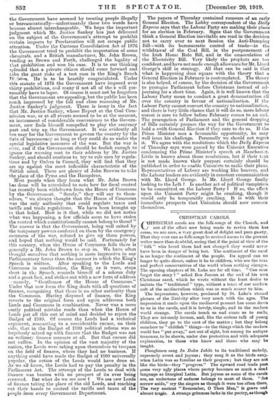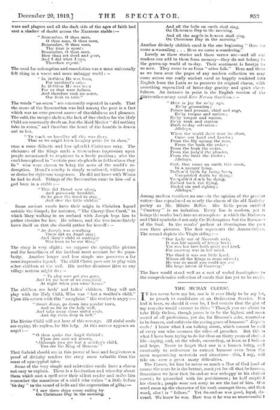CHRISTMAS CAROLS.
CHRISTMAS carols are the folk-songs of the Church, and out of the effort now being made to revive them has come, we are sure, a very great deal of delight and pure gaiety. That they ever can as folk-songs be revived seems to the present writer more than doubtful, seeing that if the point of view of the " folk " who loved them had not changed they would never have been in danger of being lost. The sentiment of the carol is no longer the sentiment of the people. Its appeal can no longer be quite direct, unless it be to children, who are the true and perfect conservatives of the world whom nothing changes. The opening chapters of St. Luke are for all time. " Can man forget the story ? " asked Ben Jonson at the end of his own Christmas carol, which he wrote without the least desire to imitate the " traditional " type, without a trace of our modern cult of the mediaevalism which was so much nearer to him.
The impressions, however, produced by St. Luke's eternal picture of the. Nativity alter very much with the ages. The impression it made upon the mediaeval peasant has come down to us in the carols, and it is lovely, simple, and to the modern world strange. The carols touch us and cause us to smile. They are intensely human, and, like the serious talk of young children, they go to the root of the matter ; but they belong somehow to " childish " things—to the things which the modern world has " put away," not out of sight, but among its antique treasures, to be shown, under duo protection and with adequate explanation, to those who know and those who may be taught.
Ploughmen sang In Duke labile to its traditional melody, supremely sweet and joyous ; they sang it as the birds sang, when Latin was as familiar as their prayers ; but they are not like the birds—they "progress." The upward road leads past some very ugly places where poetry becomes as much a dead language as liturgioal Latin. But joyous as some of the carols are, an undertone of sadness belongs to most of them. " Set sorrow aside," cry the singers as though it were too often there. The very ancient " Remember, 0 Thou Man," is grave and almost tragic. A strange grimness lurks in the poetry, as though
wars and plagues and all the dark side of the ages of faith had cast a shadow of doubt across the Nazarene stable :—
" Remember, 0 thou man,
0 thou man, 0 thou. man, Remember, 0 thou man, Thy time is spent:
Remember, 0 thou man, How thou art dead and gone, And I did what I can, Therefore repent."
The need for redemption and consolation was a more universally felt thing in a worse and more unhappy world :—
" In iiathle:n He was born, For mankind's sake: In 13athlem He was bells For us that were forlorn,
And therefore took no scorn, Our flesh to take." •
The words " no scorn " are constantly repeated in carols. That the scene of the Incarnation was laid among the poor is a fact which was an ever-present source of thankfulness and pleasure. The cold, the meagre shelter, the lack of fine clothes for the Holy Child are constantly dwelt on, but the Maid Mother " did nothing take in scorn," and therefore the heart of the humble is drawn out to her.
" To teach us lmmility all this was doll,
That so we might learn haughty pride for to shun,"
runs a more didactic and loss splendid Christmas song. The obeisance of the Kings made a tremendous impression upon people accustomed to acquiesce in a lowly position ; also the
confidence placed in "certain poor shepherds in fields where they lie " who were chosen to bring the news. of the world's re- demption. Herod's cruelty is simply mentioned, without rage or desire for righteous vengeance. He did not know with Whom he had to deal. Tidings of the Incarnation come to him—of a god born in a stable :—
" This did Herod sore af ray, And grievously bewilder, So he gave the word to slay, And slew the little chador."
Some ancient carols have their origin in Christian legend
outside the Gospel; for instance, " The Cherry-Tree Carol," in which Mary walking in an orchard with Joseph begs him to
gather cherries for her. He refuses, and the tree immediately bows itself so that she should gather for herself :-
" As Joseph was a-walking There did an Angel sing; And Mary's child at midnight Was born to be our Kink."
The story is very slight; we suppose the spring-like picture and the homelinees of the incident must account for its popu-
larity. Another longer and less simple one preserves a far more impressive legend. The child Christ goes out to play with ogler children at the well. His mother dismisses Him as any village matron might do :-
" To play now, get you gone, And let me hear of no complaint At night when you carne heme."
The children are lords' and ladies' children. They will not play with the Holy Child, Who was " but a maiden's child." Upon His return with this " complaint " His mother is angry :-
" Sweet Jesus, go down into 'yonder town,
And as far as the holy well, And take away those sinful souls, And dip them deep in hell."
The Divine Child will not hear of this revenge. All sinful souls are crying, He replies, for His help. At this answer appears an angel :—
" 0 then spoke the Angel Gabriel :
Upon one sure sot steven, 'Although you are but a maiden's child, You are the King of Heaven.' "
That Gabriel should see in this power of love and forgiveness a proof of divinity renders the story more valuable than the mass of apocryphal tales.
Some of the very simple and reiterative carols have a charm not easy to explain. There is a fascination and wizardry about them which cast a spell over their oldest reader and make him remember the sensations of a child who wakes " a little before 'tis day " to the sound of bells and the expectation of gifts: " I saw three ships come sailing by On Christmas Day in the morning.
And all the bells on earth shall ring, On Christmss Day in the morning.
And all the angels in heaven shall sing,
On Christmas Day in the morning."
Another divinely childish carol is the one beginning " Here we come a-wassailing . . . Here we come a-wandering."
Lovely as these stories and these verses are—and all our readers can add to them from memory—they do not belong to the grown-up world of to-day. Their sentiment is foreign to us now. They come to us from " other folk." Hero and there as we turn over the pages of any modern collection we may come across one really ancient carol so happily rendered into English from the Latin as to preserve its original charm, with something superadded of latter-day gravity and quiet cheer- fulness. An instance in point is the English version of the ihirteenth-century carol Ecce Nova»). GaidiUM
" Here is joy for ev'ry age, Ev'ry generation ; Prince and peasant, chief and sage, Ev'ry tongue and nation ; Ev'ry tongue and nation, Every rank and station Hath to-day salvation : Alleluya.
When the world drew near its close, Came our Lord and Leader ; From the lily sprang the rose, From the bush the cedar ; From the bush the cedar, From the judg'd the pleader, From the faint the feeder ; Alleluya.
God, that cams on earth this morn, In a manger lying, Hallow'd birth by being born, Vanquish'd death by dying: Vanquisled death by dying, Rallied back the flying, Ended sin and sighing ; Alleluya."
Among modern versifiers no one—in the opinion of the present writer—has reproduced so nearly the charm of the old Nativity poetry as Mr. Hilaire Belloc. His little poem entitled " Courtesy " is no imitation. Every line is modern, yet it brings the reader back into an atmosphere n which the Madonna and Child symbolized not only the Redemption but the Rornanee of the Soul. In the monks' parlour at Storrington the co .4 sees three pictures. The first represents the Annuneiatio e. The second depicts the Virgin riding :-
" Our Lady out of Nazareth rode, It was her month of heavy load ; Yet was her face both great and kind, For courtesy was in her mind.
The third it was our little Lord, Whom all the Kings in arms adored; He was so small you could not 53,3 His large intent of Courtesy."
The lines would stand well as a sort of verbal frontispiece to the comprehensive collection of carols that has yet to be made.







































 Previous page
Previous page